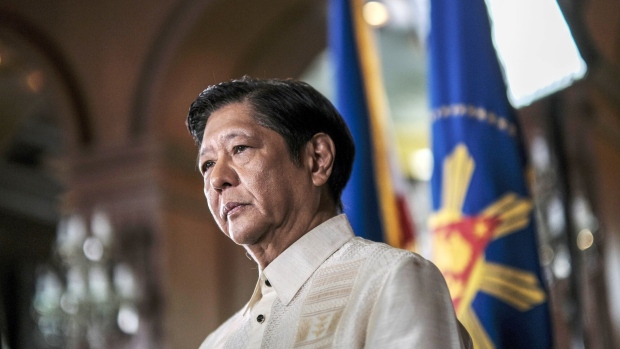Mar 19, 2024
Marcos Warns on China Threat, Says He’s ‘Not Poking the Bear’
, Bloomberg News

(Bloomberg) -- Philippines President Ferdinand Marcos Jr. said the threat to his nation from China’s sweeping claims in the South China Sea is growing but argued that his government’s efforts to assert sovereignty over disputed areas aren’t meant to start a conflict by “poking the bear.”
“We are trying to keep things on an even keel,” Marcos said Tuesday in an interview with Bloomberg Television’s Haslinda Amin at the presidential palace in Manila. The challenge, he added, is that “since the threat has grown, we must do more to defend our territory.”
Along with Taiwan, the standoff between the Philippines and China over a series of contested reefs and islands has become a critical flashpoint in the region. Since Marcos took office in 2022, the Philippine military and coast guard have ramped up operations to supply troops at a remote outpost and escort fishermen he says have relied on the waters “for generations.”
That stance has sparked condemnation from Beijing, whose armada of fishing boats and coast guard vessels have often blocked Philippine ships and even collided with them, raising the risk of a conflict with China that could quickly draw in the US.
“We have not instigated any kind of conflict. We have not instigated any kind of confrontation,” Marcos, 66, said of his government’s policies. “We are just trying to feed our people.”
But, he added, “China has taken some very aggressive actions against our coast guard.”
During a trip to deliver supplies to its outpost on the Second Thomas Shoal this month, Manila said four Filipino sailors were injured after two Chinese coast guard vessels blasted water cannons at their chartered boat.
Reversing the policies of his predecessor, former President Rodrigo Duterte, Marcos has tightened ties with the US military, giving it greater access to Philippine bases and resuming joint sea patrols. In return, Washington has strongly backed the Philippines when it comes to its efforts in the South China Sea.
The Marcos interview came on the same day US Secretary of State Antony Blinken was visiting Manila. Ahead of a meeting with Marcos, Blinken criticized what he called Beijing’s “provocative” actions.
Marcos has also strengthened ties with other US allies. The Philippines upgraded relations with Australia last year, signed defense pacts with the UK and Canada and is negotiating a deal for mutual military visits with Japan.
In a briefing on Wednesday, China’s foreign ministry said Manila was to blame for the rising tensions in the South China Sea.
“The root cause of the recent escalation in the South China Sea situation is because the Philippines have been creating trouble, provoking China and spreading misinformation to misguide the international community,” Foreign Ministry spokesman Lin Jian said.
Marcos said his nation can’t accept China’s vast claims, which Beijing bases on a 1947 map that shows a vague “nine-dash line” sweeping over most of the South China Sea. A United Nations tribunal in 2016 ruled against Beijing’s claims, a verdict Xi Jinping’s government has rejected.
Despite the standoff, Marcos emphasized that he’s kept talks with Beijing going and that he doesn’t want to be in the position of invoking a mutual defense treaty the Philippines has had with the US for decades.
Asked what might provoke him to utilize that defense accord, Marcos said the Philippines would have to be facing an “existential threat.”
“I hope the time never comes that we have to answer that question,” he said. “When you talk about the mutual defense treaty, to invoke that, actual outright violent conflict, then this is a very, very dangerous, very, very slippery road to go down.”
Below are some excerpts from the interview on other topics:
On the economy:
“Inflation is still our biggest problem,” Marcos said. Asked whether he sees more room to cut borrowing costs at the highest level since May 2007, he added: “We’re not yet there.”
Read more: Marcos Says Too Early for Philippine Rate Cut, Eyes 8% Growth
On charges he’ll change the constitution to prolong his term:
“That’s incorrect. The proposals for the amendments to the constitution are solely concerned with economic provisions, things like ownership of corporations...So the political structure of the Philippines, there’s no proposal to change that. I’m not quite sure where it came from, but it’s being used as a stick to beat this issue over our heads.”
Key challenges and geopolitical shocks:
“Climate change is another big part of the challenges that we face. Geopolitical instability, certainly, because no matter what we do here in the Philippines, we are still subject to shocks that come down the pike that we have very little control over, very little influence over and sometimes did not forecast.”
“When the Russians first entered Ukraine, the initial reaction was that, ‘Well, it’s very far away, it’s Eastern Europe, it shouldn’t affect us.’ Within a month we felt the effects. We import wheat from both countries, we import agricultural commodities from both countries. So all of these things we need to recognize now.”
On the impact of a potential second Donald Trump presidency:
Marcos said that a second Trump presidency, if it occurs, would usher in “some changes, undoubtedly,” but didn’t think the relationship would fundamentally change, given that the two countries are treaty allies.
“As long as we stay true to the agreements of those treaties that we have had, I think the foreign policy will maintain a balance and there won’t be any radical changes, radical moves.”
--With assistance from Alex Chandler, Manolo Serapio Jr., Philip J. Heijmans and Colum Murphy.
(Adds reaction from China starting in 11th paragraph.)
©2024 Bloomberg L.P.







